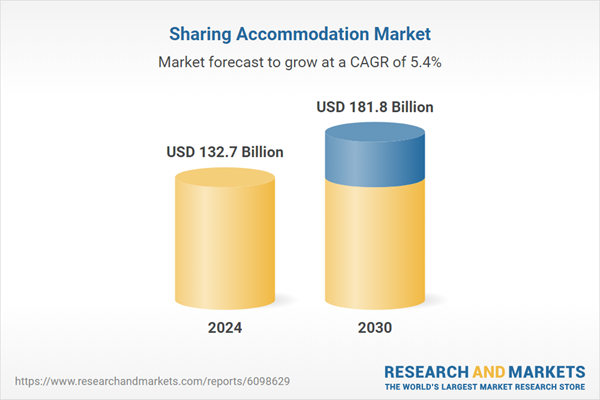Global 'Sharing Accommodation' Market - Key Trends & Drivers Summarized
Why Has Sharing Accommodation Become A Global Lifestyle Movement?
Sharing accommodation, once a fringe alternative to hotels, has rapidly evolved into a mainstream, transformative force in global travel and urban living. This model - centered around renting out private rooms, shared spaces, or entire homes - offers an experience that combines cost-efficiency with cultural immersion. Pioneered by platforms like Airbnb, Couchsurfing, and Vrbo, sharing accommodation appeals to travelers seeking authenticity, flexibility, and local connections. For urban dwellers, it has created a parallel economy where spare rooms or secondary properties generate passive income, especially in high-rent cities. Millennials and Gen Z, who prioritize experience over ownership, are particularly drawn to this concept, as are digital nomads and remote workers embracing long-term stays. The rise of the sharing economy - built on principles of resource optimization and trust-based digital platforms - has made it easy to match hosts with guests in real-time. Cities with tourism surges and housing shortages have experienced major structural shifts, with some neighborhoods transformed entirely by short-term rentals. Additionally, group travelers, families, and corporate teams benefit from the convenience and cost-splitting potential of shared accommodations. As the lines between business and leisure travel blur, this segment's appeal continues to grow, driven by a global mindset that values access, connection, and community.How Are Technology And Data Personalization Shaping The Future Of Shared Stays?
Technological innovation is the cornerstone of the sharing accommodation revolution. Booking platforms are now driven by AI algorithms that personalize recommendations based on user behavior, travel history, and social preferences. Predictive pricing tools help hosts maximize occupancy while offering competitive rates, while dynamic calendars sync across multiple platforms to prevent double bookings. The rise of smart locks, IoT-enabled appliances, and keyless check-ins has streamlined the guest experience, making shared stays as seamless as hotel check-ins. Hosts are leveraging automated messaging bots, instant translation tools, and CRM dashboards to maintain engagement and loyalty. Machine learning models filter out bad actors, prevent fraud, and enhance security through real-time ID verification and behavioral risk scoring. Furthermore, property management systems tailored for co-living and multi-unit hosting simplify operations for superhosts and small-scale operators alike. In urban hubs, shared accommodation operators are integrating with local services - food delivery, concierge apps, and mobility services - to offer a holistic stay experience. Immersive technologies like virtual reality tours and augmented property previews are enhancing user confidence during the booking process. These tech-driven upgrades are not only refining service standards but also differentiating hosts in an increasingly competitive landscape, where personalization and trust are key to retention.Where Is Sharing Accommodation Reshaping Real Estate, Travel, And Urban Culture?
Sharing accommodation is having profound ripple effects across real estate, tourism, and community dynamics. In real estate, it has birthed new property types such as hybrid apartments, purpose-built co-living spaces, and hostels-turned-smart-hosting units. Developers are now incorporating features like shared kitchens, flexible lease terms, and modular layouts tailored to short- and medium-term stays. The tourism sector is seeing a democratization of travel spend, as visitors extend their reach into less-touristed neighborhoods, distributing economic benefits more evenly across cities. Local artisans, eateries, and tour guides often experience increased business as guests seek local experiences away from traditional tourist zones. However, the influx of short-term rentals has also sparked regulatory responses, particularly in cities facing housing affordability crises - prompting licensing requirements, stay duration caps, and zoning restrictions. In cultural terms, sharing accommodation has spurred more open attitudes toward hospitality, cultural exchange, and micro-entrepreneurship. It's increasingly common to see niche offerings like eco-hosting, women-only accommodations, artist residencies, or stays tied to volunteering. Students, expatriates, and gig workers rely on shared accommodation as transitional housing, making it a vital component of the modern mobility ecosystem. As urbanization accelerates, the sector is becoming a flexible infrastructure layer that supports shifting demographics and economic activity in cities worldwide.The Growth In The Sharing Accommodation Market Is Driven By Several Factors That Reflect Changing Consumer Behavior, Platform Maturity, And Evolving Travel Patterns
One key driver is the rise of experience-driven and budget-conscious travelers, especially among millennials, Gen Z, and solo adventurers who prefer personalized, local accommodations over traditional hotels. The increasing adoption of remote and hybrid work models has created a surge in medium- and long-term stays, expanding the market beyond tourism into remote work and relocation segments. The growth of mobile-first consumers and the ubiquity of digital platforms have enabled seamless peer-to-peer connections, fueling participation by both guests and hosts. On the supply side, rising real estate costs in urban centers have incentivized homeowners to monetize unused space, while professional property managers are scaling operations using tech-enabled management tools. In developing economies, sharing accommodation provides affordable travel options for the growing middle class and supports tourism in underdeveloped regions. Another driver is the regulatory normalization in many cities, which - while initially seen as a constraint - has increased legitimacy and investor confidence in the sector. Additionally, sustainability-conscious consumers are turning to shared accommodations for their lower carbon footprint and community-based experiences. Events like festivals, conferences, and sports tournaments continue to drive demand spikes, often outpacing hotel capacity and reinforcing the utility of the shared model. Altogether, the convergence of tech, lifestyle shifts, and economic incentives is underpinning the robust, multi-dimensional growth of the global sharing accommodation market.Report Scope
The report analyzes the Sharing Accommodation market, presented in terms of market value (US$). The analysis covers the key segments and geographic regions outlined below:- Segments: Type (Business to Consumer, Business to Business, Peer to Peer); Application (Generation Z, Millennials, Generation X, Boomers).
- Geographic Regions/Countries: World; United States; Canada; Japan; China; Europe (France; Germany; Italy; United Kingdom; Spain; Russia; and Rest of Europe); Asia-Pacific (Australia; India; South Korea; and Rest of Asia-Pacific); Latin America (Argentina; Brazil; Mexico; and Rest of Latin America); Middle East (Iran; Israel; Saudi Arabia; United Arab Emirates; and Rest of Middle East); and Africa.
Regional Analysis
Gain insights into the U.S. market, valued at $36.1 Billion in 2024, and China, forecasted to grow at an impressive 8.7% CAGR to reach $36.8 Billion by 2030. Discover growth trends in other key regions, including Japan, Canada, Germany, and the Asia-Pacific.Why You Should Buy This Report:
- Detailed Market Analysis: Access a thorough analysis of the Global Sharing Accommodation Market, covering all major geographic regions and market segments.
- Competitive Insights: Get an overview of the competitive landscape, including the market presence of major players across different geographies.
- Future Trends and Drivers: Understand the key trends and drivers shaping the future of the Global Sharing Accommodation Market.
- Actionable Insights: Benefit from actionable insights that can help you identify new revenue opportunities and make strategic business decisions.
Key Questions Answered:
- How is the Global Sharing Accommodation Market expected to evolve by 2030?
- What are the main drivers and restraints affecting the market?
- Which market segments will grow the most over the forecast period?
- How will market shares for different regions and segments change by 2030?
- Who are the leading players in the market, and what are their prospects?
Report Features:
- Comprehensive Market Data: Independent analysis of annual sales and market forecasts in US$ Million from 2024 to 2030.
- In-Depth Regional Analysis: Detailed insights into key markets, including the U.S., China, Japan, Canada, Europe, Asia-Pacific, Latin America, Middle East, and Africa.
- Company Profiles: Coverage of players such as Ashley Furniture Industries, Avocado Green Mattress, Bear Mattress LLC, Bensons for Beds Limited, Brooklyn Bedding LLC and more.
- Complimentary Updates: Receive free report updates for one year to keep you informed of the latest market developments.
Some of the 47 companies featured in this Sharing Accommodation market report include:
- Accor S.A.
- Airbnb, Inc.
- AltoVita
- Bedycasa
- Booking Holdings Inc.
- Couchsurfing International
- Expedia Group, Inc.
- Fairbnb.coop
- Findroommate.dk ApS
- HomeExchange.com Inc.
- Homestay Technologies Ltd.
- Hostelling International
- InnoPeople Company Ltd.
- Kindred
- Love Home Swap
- Outsite
- Selina
- SilverDoor
- ThirdHome
- Vrbo (Expedia Group)
This edition integrates the latest global trade and economic shifts into comprehensive market analysis. Key updates include:
- Tariff and Trade Impact: Insights into global tariff negotiations across 180+ countries, with analysis of supply chain turbulence, sourcing disruptions, and geographic realignment. Special focus on 2025 as a pivotal year for trade tensions, including updated perspectives on the Trump-era tariffs.
- Adjusted Forecasts and Analytics: Revised global and regional market forecasts through 2030, incorporating tariff effects, economic uncertainty, and structural changes in globalization. Includes historical analysis from 2015 to 2023.
- Strategic Market Dynamics: Evaluation of revised market prospects, regional outlooks, and key economic indicators such as population and urbanization trends.
- Innovation & Technology Trends: Latest developments in product and process innovation, emerging technologies, and key industry drivers shaping the competitive landscape.
- Competitive Intelligence: Updated global market share estimates for 2025, competitive positioning of major players (Strong/Active/Niche/Trivial), and refined focus on leading global brands and core players.
- Expert Insight & Commentary: Strategic analysis from economists, trade experts, and domain specialists to contextualize market shifts and identify emerging opportunities.
Table of Contents
Companies Mentioned (Partial List)
A selection of companies mentioned in this report includes, but is not limited to:
- Accor S.A.
- Airbnb, Inc.
- AltoVita
- Bedycasa
- Booking Holdings Inc.
- Couchsurfing International
- Expedia Group, Inc.
- Fairbnb.coop
- Findroommate.dk ApS
- HomeExchange.com Inc.
- Homestay Technologies Ltd.
- Hostelling International
- InnoPeople Company Ltd.
- Kindred
- Love Home Swap
- Outsite
- Selina
- SilverDoor
- ThirdHome
- Vrbo (Expedia Group)
Table Information
| Report Attribute | Details |
|---|---|
| No. of Pages | 287 |
| Published | January 2026 |
| Forecast Period | 2024 - 2030 |
| Estimated Market Value ( USD | $ 132.7 Billion |
| Forecasted Market Value ( USD | $ 181.8 Billion |
| Compound Annual Growth Rate | 5.4% |
| Regions Covered | Global |









